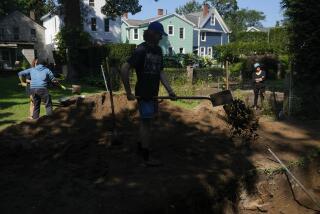Early Black Churches Yield Wealth of Data : Research: African-American religious institutions are among the foundations of race’s culture, history and heritage.
- Share via
NEW YORK — Legend has it that early black churches were made up of illiterate slaves who did not know how to preserve their history.
The truth reads a little differently.
Archives at First African Baptist Church in Savannah, Ga., founded in 1775, and at Mother Bethel African Methodist Episcopal Church in Philadelphia, founded in 1787, contain records dating to the mid-19th Century. They are among many black churches that kept such records.
To dispel the legend, the Schomburg Center for Research in Black Culture, a branch of the New York Public Library here, is making a major effort to collect materials from black churches, including manuscripts, photographs, audiovisual materials and art.
The center’s “Preservation of Black Religious Heritage Project” has paved the way for extensive research on black churches, institutions that have served as the backbone of African-American culture in the United States.
“In the study of black culture, the church is an important resource for information,” said Victor N. Smythe, project archivist, during an interview in his Harlem office. “Since black religious institutions are among the foundations of black culture, history and heritage, their records contain information useful to any scholar doing religious research about blacks in disciplines as diverse as sociology, musicology, economics and politics.
“Musical forms developed out of worship practices; musicians and performers were nurtured and inspired by worship services,” he said. Many black schools and universities were started in churches or by African-American clergymen, he added.
The project was funded by a $300,000, three-year grant from the Lilly Endowment Inc. Smythe said Lilly enhanced the project by awarding an additional $250,000 for microfilming and duplicating materials in the collection and sponsoring a series of workshops.
Materials are being collected in 14 cities, including Los Angeles and Oakland.
The collection, to be completed in December, will bring hard-to-find materials together in one place. Smythe believes that when the collection becomes available to scholars a year later, their work will get a considerable boost.
“Black religious materials for extensive research in the field are, unfortunately, widely scattered, little documented and not easily available in major repositories or denominational and church archives anywhere in the nation,” he said. “One would have to travel the length and breadth of the country to locate primary documents or copies of records to do meaningful research.”
As part of the project, researchers surveyed black church leaders in the 14 cities.
Fortunately, Smythe said, he has acquired many records before they were thrown out.
The type of materials collected by researchers includes minutes of church governing boards, committees, societies and clubs; birth, marriage and death records; printed and recorded music; records of ministries; audio and visual recordings of sermons; programs of special events;, art work and church architectural plans.
“Duplicate tapes are being made of oral history collections and pastors’ sermons and old revival meetings,” he said.
Smythe said he has trained surveyors and conducted church workshops across the country to promote the project and teach church members how to preserve their history.
More to Read
Sign up for Essential California
The most important California stories and recommendations in your inbox every morning.
You may occasionally receive promotional content from the Los Angeles Times.













